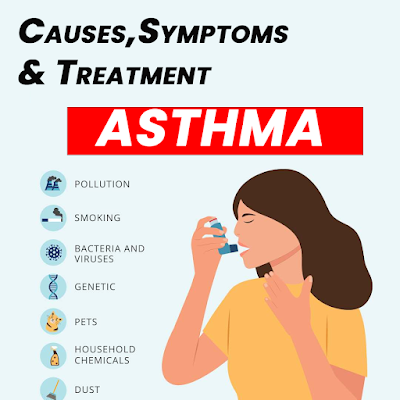An ongoing respiratory disorder that damages the lungs' airways called asthma, causes various symptoms, from mild to severe. The severity of asthma symptoms can vary from person to person and even within the same individual over time. Here's an overview of mild and severe symptoms of asthma.
Mild Symptoms of Asthma:
Coughing: Often dry and persistent, especially at night or early in the morning.
Wheezing: High-pitched whistling sound when breathing, usually during exhalation.
Shortness of Breath: Feeling breathless or unable to take a deep breath.
Chest Tightness: Discomfort or pressure in the chest area.
Difficulty Sleeping: Symptoms can worsen at night and disrupt sleep.
These mild asthma symptoms might not always interfere significantly with daily activities and can sometimes be managed with lifestyle changes and
occasional use of quick-relief medications.
Severe Symptoms of Asthma:
Extreme Shortness of Breath: Feeling unable to catch one's breath even at rest.
Worsening Wheezing and Coughing: Wheezing and coughing become louder and more persistent.
Use of Accessory Muscles: Breathing involves using muscles in the neck and chest due to difficulty breathing.
Cyanosis: Lips, fingertips, or face turning blue due to lack of oxygen.
Difficulty Speaking: Inability to form complete sentences due to breathlessness.
Agitation or Confusion: Oxygen deprivation can lead to mental confusion.
Reduced Peak Expiratory Flow: A significant drop in peak expiratory flow rate measures how fast one can blow air out of the lungs.
These severe asthma symptoms require immediate medical attention and intervention. If a person's symptoms escalate to the point where they are experiencing extreme difficulty breathing, it is essential to seek medical help.
Asthma can be a severe condition that requires proper medical management.
Here are a few home remedies for asthma that some individuals might consider:
Maintain a Clean Environment: Keep your living space clean and free from dust, pet dander, mold, and other potential allergens that can trigger asthma symptoms.
Use Air Purifiers: Consider using air purifiers with filters to help remove allergens and particles from the air.
Stay Hydrated: Staying well-hydrated can help keep mucus in the airways thin and easier to clear.
Breathing Exercises: Certain breathing exercises, like pursed-lip and diaphragmatic breathing, may help improve lung function and reduce asthma symptoms.
Herbal Remedies: Some people believe that herbs like ginger, turmeric, and licorice root have anti-inflammatory properties that could benefit asthma symptoms.
Honey: Some individuals find relief from asthma symptoms by consuming raw honey. Honey may have anti-inflammatory properties, but more research is needed to understand its effects on asthma fully.
Omega-3 Fatty Acids: Foods rich in omega-3 fatty acids, such as fatty fish (salmon, mackerel), flaxseeds, and walnuts, may have anti-inflammatory properties that could help manage asthma symptoms.
Steam Inhalation: Inhaling warm, moist air from a bowl of hot water or a steam inhaler might help ease breathing difficulties temporarily. Adding a drop or two of eucalyptus oil to the water could provide additional relief.
Relaxation Techniques: Stress and anxiety can sometimes trigger or worsen asthma symptoms. Practicing relaxation techniques like yoga, meditation, or mindfulness might help manage stress and improve asthma control.
Vitamin D: Maintaining adequate vitamin D levels might benefit people with asthma, as it could affect immune and lung function. However, consult a healthcare professional before taking any supplements.
For More References Visit Us
https://www.bloglovin.com/@bharathomeopathy1/asthma-wellness-integrating-medication-self
https://www.minds.com/newsfeed/1540614917055320065?referrer=bharathomeopathy2810

.png)

.png)



